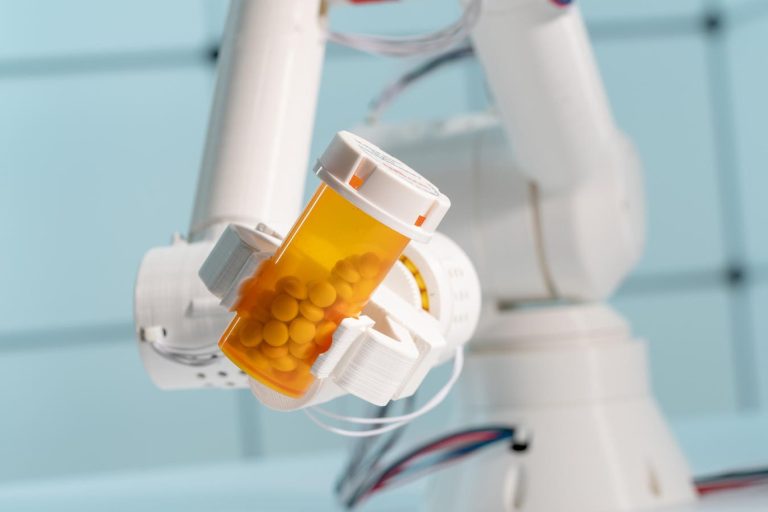Robotic arm holding a bottle of pills
getty
What's the current state of AI in healthcare? According to Mayo Clinic's Dr. John Halamka and Paul Cerrato, “Deployment is the key.” Of the numerous AI solutions for healthcare developed by startups and established companies, there have been few practical implementations so far. “For a solution to work within a health system, it must adhere to certain governance protocols, integrate with IT systems, and have the support of the clinicians and administrators who use it on a daily basis,” Halamka said. Cerrato writes.
An example of such a tightly integrated and functional AI solution was announced last month by Ballad Health, a leading healthcare provider in the Appalachian Plateau. For more than a year, Ballad Health has been implementing MedAware's AI-based pharmacovigilance platform, embedding it within the workflow of its Epic electronic medical record, or EMR, system. For AI health startups, “the biggest challenge is finding partners who are patient and willing to integrate with major EMRs, especially Epic,” said Gidi Stein, co-founder and chief scientific officer at MedAware. states.
MedAware helps Ballad pharmacists identify evolving risks of drug-related harm during a patient's hospitalization, providing visibility into individualized, patient-specific drug-related risks. This time-sensitive view allows Ballad pharmacists to quickly identify high-risk patients by severity, better prioritize patient care, and improve efficiency. As a result, Ballad Health expects thousands of patients will be safe from adverse drug events.
Medical errors can be responsible for more than 250,000 deaths annually in the United States alone. Approximately 70% of medication errors that result in adverse drug events are prescribing errors. After witnessing such mistakes while working as a physician at a major Israeli hospital, Stein launched MedAware as a data-driven platform for patient safety.
Widely used decision support systems help physicians identify potential risks and drug interactions, and use established rule bases based on what is known about specific drugs as they apply to the general population. approach. Stein derived the idea for MedAware's solution from the shift he observed in the financial services industry from rules-based to data-driven systems for fraud identification. From alerting banks and consumers whenever the system identifies common anomalies to sounding an alarm only when: There was a trail of personal data and deviations from the normal behavior of certain customers.
“Systematic failures require systematic solutions,” Stein says. Existing drug safety systems fail in many ways, usually involving different elements of the health care system. Because many of the alarms generated are false alarms, doctors, pharmacists, and nurses tend to develop “alarm fatigue” and ignore alarms. At the same time, “there are many other types of risks that these rules-based systems can't detect,” Stein says. Additionally, they failed to consider what Stein calls the “temporal dimension,” paying attention to new risks associated with lab tests and vital signs and other data that arrive after the drug has been prescribed and dispensed. I am.
In contrast, MedAware's solution is a 24/7 monitoring system that is a patient-specific, adaptable tool that “reduces the number of alerts by more than 90% and improves clinical accuracy and actionability.” ,” Stein said. The MedAware platform not only monitors a specific patient's current condition in real time, but also recognizes the patient's past medical history and can point out potential risks in the future.
MedAware's predictive ability was recently confirmed in a Harvard Medical School study. This study used more than 649,000 outpatient records to validate MedAware's algorithm for identifying patients at risk for opioid use disorder (OUD). The MedAware solution achieved over 93% accuracy compared to two expert opinions.
Many patients develop OUD after being prescribed opioids, resulting in more than 70,000 deaths annually in the United States. MedAware helps doctors make better decisions when prescribing opioids and identifying patients in the early stages of addiction. “The patients we identify are early enough in the process that there's a good chance we can save them from themselves,” Stein says. Additionally, the MedAware platform can be used as a population health tool to screen large populations to identify those requiring further evaluation for suspected OUD.
Another potential use of the MedAware platform – adding AI algorithms to medical devices – is being demonstrated through our collaboration with Baxter International. Smart infusion pumps use a Dose Error Reduction System (DERS) to prevent medication errors by checking programmed doses against drug-specific preset limits. Developing meaningful DERS limits across all drugs and care areas within a hospital's drug library and rolling out the necessary changes across thousands of pumps throughout the hospital can be difficult and require extensive analysis and maintenance. resources are required.
The Baxter study analyzed 3,823,367 injections performed over a 10-month period and found 44,819 pump programming entries that were outliers from typical programming patterns. Approximately 25% of these outliers were identified by MedAware's algorithm, but did not trigger a DERS and the clinician received no alert. According to Baxter researchers, the study aims to improve patient safety by building and maintaining a smart infusion library that uses AI to dynamically review infusions and notify of potential infusion errors. The possibility of improving this has been demonstrated. “This is a completely different application based on the same core technology that we developed,” Stein says.
MedAware serves as a great example of three important developments. A. The success of AI solutions for healthcare will largely depend on their integration with a healthcare system's existing infrastructure and business practices. B. MedAware's approach to applying AI to patient safety represents a general shift in healthcare and other areas from rules-based to data-driven solutions that enable personalization. C. Modern AI, or machine learning models that analyze large amounts of data, are driving a shift from high-volume services to personalized, limited-customer, and even individualized services.

